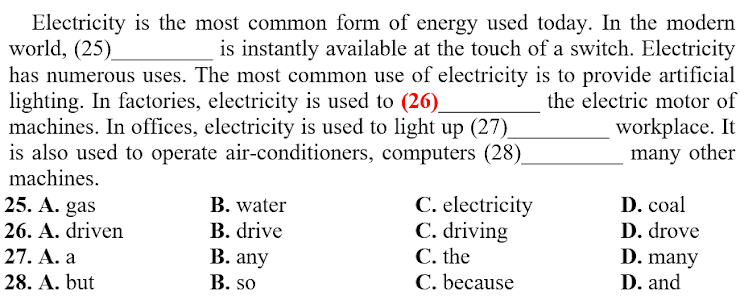Read the following passage and mark the letter A, B, C, or D on your answer sheet to indicate the correct answer to each of the questions.
Are organically grown foods the best food choices? The advantages claimed for such foods over conventionally grown and marketed food products are now being debated. Advocates of organic foods – a term whose meaning varies greatly – frequently proclaim that such products are safer and more nutritious than others.
The growing interest of consumers in the safety and more nutritional quality of the typical North American diet is a welcome development. However, much of this interest has been sparked by sweeping claims that the food supply is unsafe or inadequate in meeting nutritional needs. Although most of these claims are not supported by scientific evidence, the preponderance of written material advancing such claims makes it difficult for the general public to separate fact from fiction. As a result, claims that eating a diet consisting entirely of organically grown foods prevents or cures disease or provides other benefits to health have become widely publicized and form the basis for folklore.
Almost daily the public is besieged by claims for “no-aging” diets, new vitamins, and other wonder foods. There are numerous unsubstantiated reports that natural vitamins are superior to synthetic ones, that fertilized eggs are nutritionally superior to unfertilized eggs, that untreated grains are better than fumigated grains and the like.
One thing that most organically grown food products seem to have in common is that they cost more than conventionally grown foods. But in many cases consumers are misled if they believe organic foods can maintain health and provide better nutritional quality than conventionally grown foods. So there is real cause for concern if consumers, particularly those with limited incomes, distrust the regular food and buy only expensive organic foods instead.
According to the last paragraph, consumers who believe that organic foods are better than conventionally grown foods are often _______.
A. careless
B. mistaken
C. thrifty
D. wealthy


Đáp án B.
Key words: last paragraph, organic food, better than.
Câu hỏi: Theo thông tin đoạn cuối, người tiêu dùng thường như thế nào nếu họ tin rằng thực phẩm hữu cơ tốt hơn thực phẩm được trồng truyền thống?
Clue: “But in many cases consumers are misled if they believe organic foods can maintain health and provide better nutritional quality than conventionally grown foods.”: Nhưng trong nhiều trường hợp người tiêu dùng bị lầm tưởng nếu họ tin thực phẩm hữu cơ có thể duy trì sức khỏe và cung cấp chất lượng dinh dưỡng tốt hơn là thực phẩm được trồng truyền thống.
Ta chọn đáp án B. mistaken: lầm tưởng, nhầm lẫn.
Các đáp án khác không phù hợp:
A. careless: bất cẩn
C. thrifty: tiết kiệm
D. wealthy: giàu có